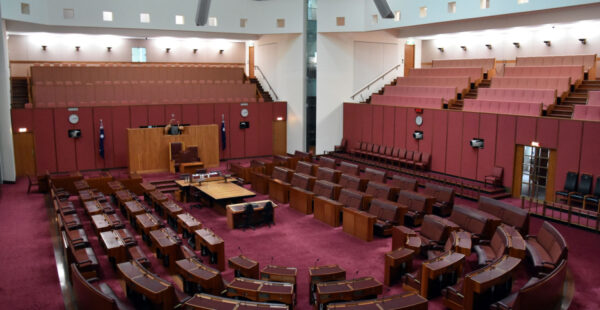Is the ALP facing another franking credits moment?

One of the men at the forefront of successfully campaigning against the Australian Labor Party’s removal of franking credits, Geoff Wilson, is lining up against the Government’s super tax proposals which would result in the taxation of unrealised gains.
Wilson, the chair and chief investment officer of Wilson Asset Management, has told a Senate Economics Legislation Committee review that he is not only opposed to the taxation of unrealised gains but the allied proposal not to index the $3 million superannuation tax threshold.
The Government’s policy changes are facing a difficult passage through Senate, particularly with respect to the taxation of unrealised capital gains.
“We object to the proposed changes based on the significant stress they will place on Australian superannuants who will be expected to pay tax on unrealised capital gains that may never be realised,” Wilson said.
“Further, we object to the lack of indexing, therefore transferring tax liabilities to younger generations.”
“We believe these changes place SMSFs at a significant disadvantage to large industry funds due to the practicalities of managing capital flows on taxed unrealised gains,” Wilson’s submission said.
“We believe these changes will distort investment markets and alter the incentive for retirement plans by disincentivising Australians to put money into superannuation,” he said.
On the question of the Government failing to index the $3 million cap, Wilson said that, instead, the large superannuation balance threshold should be indexed to inflation each year.
He said that, not to do so, would impact hundreds of thousands of Australians over time.
“This will undermine Australia’s superannuation system as we know it, encouraging younger people to take on more risk in their investments and older superannuants to restructure their investments away from providing patient capital in illiquid assets,” Wilson said.
He said he believed Treasury and the Government are “underestimating the long-lasting and broad-reaching impact these proposed laws will have on those saving for their retirement”.
“Amendments should be made to focus on realised capital gains with an index introduced to safeguard younger generations.”











It ain’t structured so well but it’s the right policy.
RBLs should never have ceased in 2007.
These very large Super balances, many in pensions had 10 years on a complete tax free rort.
I had a client who went from $80k pa tax on his super pensions pre 2007 changes to no tax. This one individual thus saved over $800k tax from 2007 to 2017.
What about SMSF $500 Million Person, how much tax did they not pay in that 10 years ?
Cry me a river if they should not pay some more taxes now.
How much further should we keep exacerbating wealth inequality ?
The logical response to the stupidity of the 2007 reforms should have been a re-imposition of the end benefit tax. But, once given, hard to take back. Taxing end benefits at MTR less 15% (on only the taxed component) is the best way to increase the super tax haul without disadvantaging those on low means. Run the tax impost post June on a 6% drawings from a $1m super pension (assume all taxed). Just about tax free if no non-super income. If Treasury would model this and show it to the government, the political side of things would be safe as it only the better off paying tax etc. Even a $3m balance, assuming same inputs, would only be taxed at c13%.
As to the minted end of the super sector, they, like all of us, will not live for ever and I expect the tax haul from the death benefits will be a river of gold. Death benefits is an end benefit tax – lump-sums and pension drawings should be also taxed. It is preferable to work to better the existing than keep adding new (and poorly designed) new taxes to fill budget holes.
Yeh that’s the problem, you are looking for Logic.
Canberra morons have no concept of Logic or Reality.
And plenty of Rich boomers will get advanced notice of terminal illness and be able to pull it all out of super with No Death Benefit tax.
Voice of reason.
This measure has never been about “a mere 80,000 odd folks”, it is fundamentally flawed and simply a political stunt. When you have a government siding with one side of the super sector to design a “sector neutral” framework to tax more of large balance earnings, you know it is political.
There are better ways the tax impost could be imposed. We have a precedent with the super surcharge (Division 293), whereby, in addition to fund level tax, a member with income +$250,000 has additional liability. This time (and another uncreative naming) we have Division 296 to impose tax on higher balance super members, at a member, and then personal level. Conceptually not beyond most expectations however, the basis of the tax must be sound, equitable and relatable. None of these measures can be ticked with the design of the Div 296 tax bill.
Fair enough, the process has to be able to be bolted into existing ATO systems to avoid unnecessary (new) implementation costs however, that shouldn’t come at the expense of fair process and equity across the superannuation sector.
The most logical solution here is to use the TSB to identify the members that are in scope and then, apply deeming to the amount of capital in excess of $3m. Deeming is not hard, it is a basic tenant of the Social Security means test and a better proxy for actual, given the rates move in concert with the economic cycle.
As to the indexation, again political. The official reason is that “future governments can move the threshold as they see fit”. I can see it being number 1 on every new governments “to-do-list” (not). There are other non indexed thresholds in super and unsurprisingly, no subsequent government has ever had the inclination to raise the level.
The broader issue (remembering that broad based tax reform is a bridge too far for the government) is that super thresholds need a real thorough going over. We have a plethora of differing thresholds and too many reference points to test for indexation and, as mentioned, some are set at levels from the long distant past. Indexation should be either CPI or AWOTE. CPI seems more logical. Simplification of super thresholds would de-clutter and de-mystify super in a meaningful way.
From 1 July, the concessional contributions index, but the TBC (and hence the TSB) doesn’t. This is the reverse of last year where the TSB (CPI Linked) went up, not one segment but 2, but the concessional contribution cap was static (AWOTE). This resulted in the maximum contribution base to determine quarterly SG responsibility coming within a whisker of the $27,500 cap for the year.
The thing with all this is that advice remains essential for people to navigate so, interesting times ahead to see how the adviser is broadened. The new advice cohort will need to preform a lot of mental gymnastics to manage the ever increasingly complex super system.
The pity of all this politicising of superannuation is that the Government doesn’t (and doesn’t want to) understand how individuals are affected.
Super policies are dreamed up by Canberra public servants who don’t rely on superannuation savings for their retirement benefits. Along with retired politicians they get an index-linked (CPI) pension based on the average of their final two years earnings. All paid for by the taxpayer.
If the Government of the day wants to be serious about levelling the playing field then this is the first area they should be addressing.
The taxing of unrealised earnings and not making provision for changes to the threshold at which this happens is just another example of the politics of jealousy. For Canberra public servants everyone else is “them” and the enemy. “They” (public servants) seem to think everyone else is better off than they are and want to drag everyone else down to their financial level. I wouldn’t mind joining the gravy train “they” are on.
And in case you have any doubts, I have personally encountered this “them” and “us” mentality.
A little correction please. Since 2004, when John Howard responded to some sledging from that idiot Mark Latham and abolished the PSS super scheme, new public servants have all been on accumulation only, and no special pension deals based on final salary. Yes their employer puts in around 15% but they are just like the rest of you when it comes to riding off into the sunset with the nest egg. If you’re in the old PSS you would be on the last third of your working life and I don’t think there’s a lot of them left, certainly not in the upper echelons were policy is made
No need to worry about the new advice cohort – Apparently they will be internally trained.
Absolute pros.